
Kenneth Hare Bicker-Caarten (29 August 1911 - 1980) was an English actor who worked under the name Kenneth Carten.

Kenneth Hare Bicker-Caarten (29 August 1911 - 1980) was an English actor who worked under the name Kenneth Carten.
Kenneth Hare Bicker-Caarten was born on 29 August 1911 at Blomfield Road, Maida Vale, London, the son of middle-class parents Catherine and Edwin Hare Bicker-Caarten. [1] His sisters were playwrights Waveney Carten and Audrey Carten.[ citation needed ]
Tallulah Bankhead, a very close friend of his sister, Audrey, became a surrogate mother to Carten, who during the summer break from Eton College, went to live with them. [2]
In the late 1930s, with his sister, Audrey, he frequented the social circle of Elvira Mullens Barney.[ citation needed ]
After leaving acting, he became a theatrical agent; his clients included Laurence Olivier, Noël Coward and Googie Withers. He discovered and represented Peter Sallis. [7] He worked for the Myron Selznick corporation.[ citation needed ] He represented also Amelia Hall, who, in her memoirs, wrote: "I returned to my Hampstead digs and phoned Kenneth Carten. "Mr Carten, I cannot take part in the murder of a masterpiece." In his quiet, English way Kenneth Carten reasoned with me. He asked me to realize that not every day did an actress come to England from abroad and within two or three weeks land a role like Amanda. He begged me to put up with the script. I did. Looking back, I marvel that I was allowed to work, for I did not belong to British Equity, nor to any union." [8]
He died in Kensington in 1980.
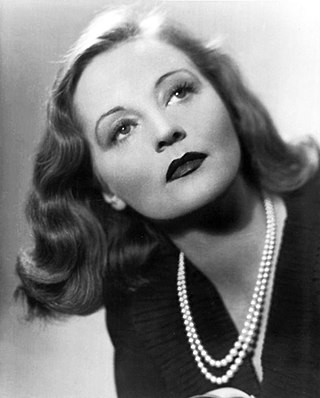
Tallulah Brockman Bankhead was an American actress. Primarily an actress of the stage, Bankhead also appeared in several films including an award-winning performance in Alfred Hitchcock's Lifeboat (1944). She also had a brief but successful career on radio and made appearances on television. In all, Bankhead amassed nearly 300 film, stage, television and radio roles during her career. She was inducted into the American Theater Hall of Fame in 1972 and the Alabama Women's Hall of Fame in 1981.

Private Lives is a 1930 comedy of manners in three acts by Noël Coward. It concerns a divorced couple who, while honeymooning with their new spouses, discover that they are staying in adjacent rooms at the same hotel. Despite a perpetually stormy relationship, they realise that they still have feelings for each other. Its second-act love scene was nearly censored in Britain as too risqué. Coward wrote one of his most popular songs, ‘Someday I'll Find You’, for the play.
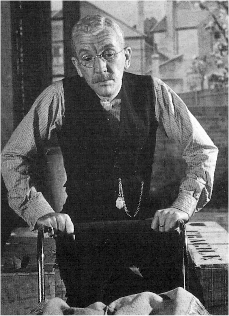
This Happy Breed is a play by Noël Coward. It was written in 1939 but, because of the outbreak of World War II, it was not staged until 1942, when it was performed on alternating nights with another Coward play, Present Laughter. The two plays later alternated with Coward's Blithe Spirit. The title, a reference to the English people, is a phrase from John of Gaunt's monologue in Act II, Scene 1 of Shakespeare's Richard II.
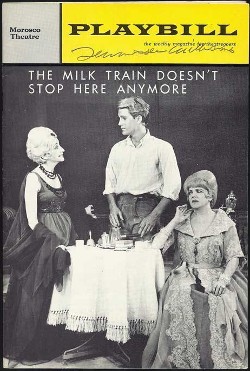
The Milk Train Doesn't Stop Here Anymore (1962) is a play in a prologue and six scenes, written by Tennessee Williams. He told John Gruen in 1965 that it was "the play that I worked on longest," and he premiered a version of it at the Festival dei Due Mondi in Spoleto, Italy, in July 1962.

Fallen Angels is a comedy by the English playwright Noël Coward. It opened at the Globe Theatre, London on 21 April 1925 and ran until 29 August. The central theme of two wives admitting to premarital sex and contemplating adultery met hostility from the office of the official theatre censor, the Lord Chamberlain, and the necessary licence was granted only after the personal intervention of the Chamberlain.

The Honourable David Alexander Reginald Herbert was a British socialite and writer.
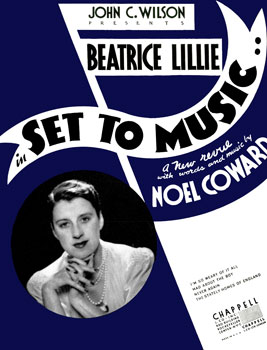
Set to Music is a musical revue with sketches, music and lyrics by Noël Coward.

Sir Noël Peirce Coward was an English playwright, composer, director, actor, and singer, known for his wit, flamboyance, and what Time called "a sense of personal style, a combination of cheek and chic, pose and poise".
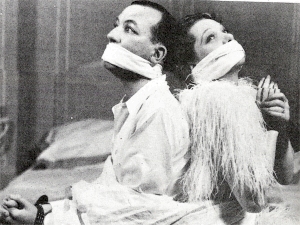
Ways and Means is a short comic play by Noël Coward, one of ten that make up Tonight at 8.30, a cycle written to be performed across three evenings. The story concerns an heiress and her gambling husband, who are plagued by debt and embarrassment as everything seems to always go wrong for them. Their honour is saved just in time when a disgraced chauffeur tries to rob them but amiably ends up pulling them out of a hole.

Red Peppers, described as "an interlude with music", is a short comic play in two scenes by Noël Coward. It is one of ten short plays that make up Tonight at 8.30, a cycle written to be performed in groups of three plays across three evenings. The original production, starring Coward and Gertrude Lawrence played in a pre-London tour, and then the West End, and finally New York, in 1935–1937. Red Peppers has been revived periodically and has been adapted for the cinema and television.
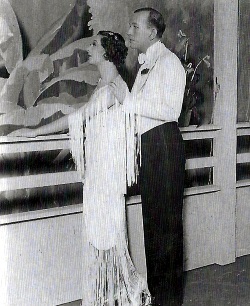
We Were Dancing is a short comic play in two scenes by Noël Coward. It is one of ten short plays that make up Tonight at 8.30, a cycle written to be performed in groups of three plays across three evenings. The original production, starring Coward and Gertrude Lawrence played in a pre-London tour, and then the West End, and finally New York, in 1935–1937. We Were Dancing has been revived periodically and was adapted for the cinema in 1942.
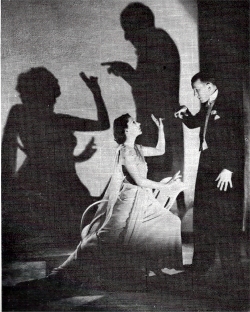
Shadow Play, described by the author as "a musical fantasy", is a one-act play by Noël Coward, one of ten that make up Tonight at 8.30, a cycle written to be performed across three evenings. Short plays were unfashionable in the 1920s and 30s, but Coward was fond of the genre and conceived the idea of a set of brief pieces to be played across several evenings. The actress most closely associated with him was Gertrude Lawrence, and he wrote the ten plays as vehicles for them both.
Star Chamber is a one-act play by Noël Coward, one of ten that make up Tonight at 8.30, a cycle written to be performed in alternating groups of three plays, across three evenings. In the introduction to a published edition of the plays, Coward wrote, "A short play, having a great advantage over a long one in that it can sustain a mood without technical creaking or over padding, deserves a better fate, and if, by careful writing, acting and producing I can do a little towards reinstating it in its rightful pride, I shall have achieved one of my more sentimental ambitions."

Still Life is a short play in five scenes by Noël Coward, one of ten plays that make up Tonight at 8.30, a cycle written to be performed across three evenings. One-act plays were unfashionable in the 1920s and 30s, but Coward was fond of the genre and conceived the idea of a set of short pieces to be played across several evenings. The actress most closely associated with him was Gertrude Lawrence, and he wrote the plays as vehicles for them both.

Family Album, described as "a Victorian comedy with music", is a short comic play in one scene by Noël Coward. It is one of ten short plays that make up Tonight at 8.30, a cycle written to be performed in groups of three plays across three evenings. The original production, starring Coward and Gertrude Lawrence played in a pre-London tour, and then the West End, and finally New York, in 1935–1937. Family Album has been revived periodically and has been adapted for television.
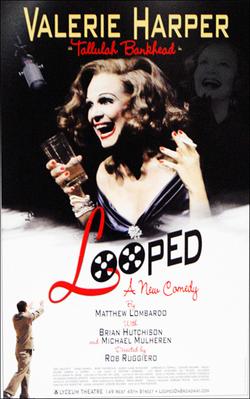
Looped is a play by Matthew Lombardo about an event surrounding actress Tallulah Bankhead. It had a Broadway run in 2010, after two previous productions in 2008 and 2009, all three of them featuring Valerie Harper.

Gwendoline "Gwen" Farrar was an English duettist, cellist, singer, actress and comedian.

Winsor French was a society columnist for the Cleveland Press.

Audrey Hare Bicker-Caarten (1900–1977) was an actress and playwright who worked under the name of Audrey Carten.

Waveney Hare Bicker-Caarten (1902-1990) was an English playwright writing under the name of Waveney Carten in collaboration with her sister, Audrey Carten.